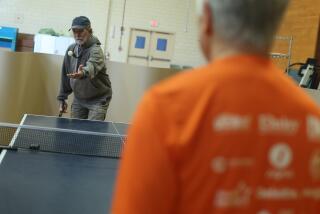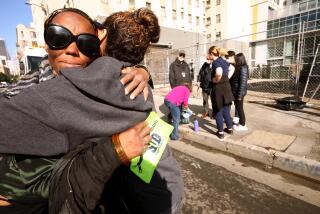SANTA ANA : Mental Ills of the Aged Addressed
- Share via
If an elderly person begins behaving oddly--withdrawing socially, lashing out at loved ones or rambling about bizarre subjects--family members often dismiss the behavior in hushed tones. These same relatives, however, probably would seek medical help quickly if a younger person behaved the same way.
That’s a double standard in American health care that may be as unnoticed as it is widespread, said Jamie Quackenbush, director of Golden Years, a geriatric psychiatric program at Coastal Communities Hospital. The program, he said, strives to care for these senior citizens, whose conditions are neither inevitable nor incurable.
Family members “just resign themselves and assume that that’s what happens when you get old,” Quackenbush said. “And many times they’re wrong to make that assumption. Many times, therapy and medication can resolve these problems.”
As they do with younger people, the mental problems of the elderly run the gamut from depression to substance addiction to schizophrenia, he said. Problems can be triggered or worsened by organic disorders, or even by side effects of various medications prescribed for physical health problems.
“What people need to know is that grandma or grandpa is not supposed to be like that, and they are not happy like that,” said Quackenbush, who said mental disorder symptoms include overall mood change, erratic behavior and sudden diet or sleep changes.
While Quackenbush, whose program has cared for more than 200 patients since opening in May, 1991, stresses the need for the elderly to get equal access to mental health care, he notes that the treatment required in each case is different. Hence Golden Years’ specialized approach, he said.
Because of the age of the patients, about 75 to 78, the program places greater emphasis on physical care than most psychiatric programs. The different metabolic rate and sometimes delicate conditions of older patients must also be considered in prescribing medications, said staff psychiatrist Santi Pattera.
The 25-member staff on Golden Years’ ward works closely with social workers, physical therapists, dietary consultants and other hospital specialists.
For the patients, it means a daily regime of care designed to make their bodies stronger while healing their minds. For the 20 or so patients in the bright, open ward, the typical day includes group and individual counseling, crafts, entertainment, family member meetings and various physical therapy sessions.
The day begins about 8 a.m. with showers and breakfast, followed by the first group session--”reality orientation.”
The orientation, aimed at jogging minds that might be confused, begins slowly, with therapist Rhonda Jarema speaking and touching each of the patients, who are dressed in street clothes to discourage an institutional atmosphere. Jarema asks volunteers to name the day and date, which she writes in marker on a board. Then, thumbing through the day’s newspaper, she quizzes the group on the day’s events.
One of the program’s volunteer assistants, Virginia McClurg, said she sees success stories among the patients every day, including herself.
“I was one of the patients here,” said McClurg, 70, of Long Beach, recounting her serious bout with depression and alcoholism. She said she had withdrawn and become belligerent by the time she ended up at Golden Years. “They brought me back to the way I was. They showed me what was good in my life.
“So now I’m back to see if I can help someone else come back,” she said.
More to Read
Sign up for Essential California
The most important California stories and recommendations in your inbox every morning.
You may occasionally receive promotional content from the Los Angeles Times.













